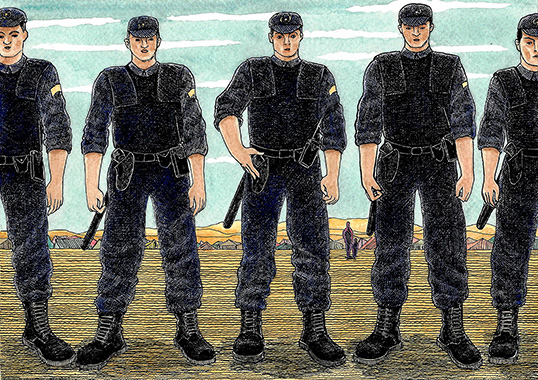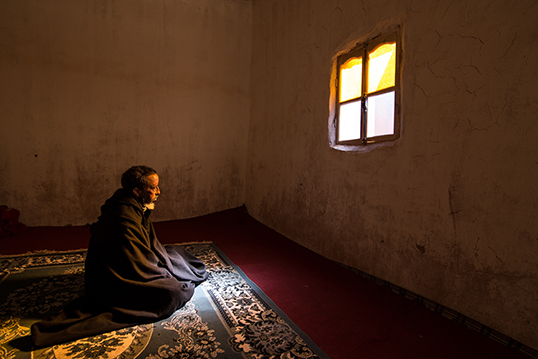
Hamida Abdulah, a former resistance fighter, military instructor of the Polisario Front, and a self-taught doctor in his home in the refugee camp Boujdour. Tindouf Province, Algeria, January 2015. © by Bartek Sabela
That way I’d never be able to find out who Hamza is. Born in 1982; profession: poet; political orientation: pro-Polisario, activist. That’s in short what his dossier might look like, a dusty file lying on a desk in a Moroccan police station. Stapled to it would be a photograph showing an oval face with a long aquiline nose, wide-open eyes, dense black stubble and dense black hair. In a word: a Sahrawi, and if he’s a Sahrawi he must be a separatist. Hamza Lakhal is well known both to the police and to his people. Not famous, just well known, whatever colouring these words might have in this context. Some Sahrawis are said to know his poems, although ‘know’ in this case doesn’t mean ‘read.’ You can’t read Hamza Lakhal’s work in El Aaiún; at best you can listen to it during a secret poetry night on a rooftop or in a basement somewhere in the suburbs.
‘I started about ten years ago, maybe even earlier,’ says Hamza, lighting another cigarette. ‘Look, there’s no tax stamp, they’re smuggled, I’m skinning the Moroccan taxman right now,’ he laughs. ‘In 2002 I kept trying to get into a poetry event, obviously one for Moroccans, officially there aren’t any others, and even those are rare. Once I was lucky, I walked onto the stage and recited my poem. The crowd fell silent. They haven’t let me in since.’
That same year, Hamza was expelled from school, and in grand style, too. The authorities brought him to book for having organised student protests that brazenly demanded that a university be established in El Aaiún. Then students wouldn’t have to travel all the way to Agadir, or even farther, to Casablanca or Rabat. Things aren’t so bad if you get into university in Agadir; it’s only four hundred miles and the bus costs two hundred dirhams. But Sahrawis are usually sent farther away, sometimes as far as Tangier, eight hundred and eighty miles from home. Now, ten years down the line, Hamza will be able to sit his school exams, and, if all goes well, the authorities might let him go on to university. In fact he always wanted to be a musician, to play the guitar like Mark Knopfler or David Gilmour. Or be an artist. He was a painter for a while and keeps a couple of his works at home, but he doesn’t show them to anyone.
Somehow, he himself doesn’t know why, he became a poet instead of a musician. He thinks that perhaps it’s because of the conditions in which he was fated to grow up, and that poetry might help him redeem his childhood self. ‘I used to be really scared. I was a terribly fearful kid. Now I think I’m trying to confront all those memories. Those gutted pillows, smashed furniture, books being thrown off their shelves, shattered windows, wrecked doors. And policemen in black standing over my parents.’
Hamza writes in classical Arabic, though the language of the Sahrawis is the Hassaniya dialect. ‘Classical Arabic is a sort of base for many languages that you, from your European perspective, treat as Arabic,’ he says. ‘It’s a bit like Latin in your case. It’s the base for lots of languages, only Latin is dead, while classical Arabic continues to be a living language.’
A few years ago Hamza published his first volume of poetry. However, he wasn’t able to do it his own city. No one would publish a Sahrawi’s poems here, especially if they said anything about the fatherland or independence. Hamza’s collection was published in France by L’Harmattan. The Harmattan is a strong, dry wind. It blows from the Sahara. ‘I don’t even know what my book looks like,’ says Hamza with a bitter smile. ‘When it came out the publisher invited me for a reading in France, but the Moroccan authorities rejected my passport application. I didn’t go. Then they wanted to send me a parcel by post at least, but that didn’t work out either. So I haven’t got a single copy.’
Hamza would love to study for a Ph.D., preferably in philosophy. But that’s unlikely to happen, as Sahrawis aren’t admitted to higher academic degrees. He is, by necessity, completely and absolutely self-taught. In El Aaiún, if you want to accomplish anything, you must do it yourself. No one else is going to help you. You want to learn English or French? There aren’t any courses, so you teach yourself by watching films online and listening to songs. You want to read? Then you have to get hold of the books yourself; there aren’t any bookshops or libraries, and if you order books from abroad it’s unlikely they’ll ever arrive. But Hamza likes to read, at home, in a café, in the desert. Then for a brief moment he doesn’t have to be in the here and now, in occupied El Aaiún. He obtains his books through acquaintances who travel to Morocco. Everything is available in Agadir or Rabat; people will always bring back one thing or another. Hamza likes Arabic writing best, but he also reads European and American literature. As a kid he adored Homer’s Iliad. ‘I imagined I was a knight wearing a beautiful suit of armour on a magnificent horse. And I was immortal like Achilles. The guys on the other side were Moroccans.’
Then came a time for Shakespeare, Marlowe, and ancient philosophers from various cultural spheres—Confucius, Aristotle, Socrates. Hamza especially admires Socrates for his uncompromising attitude. After all, he could have escaped death, his students urged him to flee, and yet he decided not to. He died for his beliefs, firm and unshakeable to the very end. But Hamza’s most important influence is Mahmoud Darwish, the Palestinian poet and member of the Palestine Liberation Organization.
I see what I want of prison: a flower’s days
passed through here to guide two strangers within me
to a seat in the garden, and I close my eyes:
Spacious is the land, beautiful through a needle’s eye.
It is Darwish who taught Hamza that in the struggle for freedom, poetry can be as effective a weapon as a rifle. ‘Not because it could change reality. No, let’s not exaggerate, I don’t believe in that. But it opens up the windows of the imagination and of dreams,’ he says, changing the music. This time it’s Eric Clapton in concert.
At first I was anxious that sooner or later my presence in Hamza’s house would get him into trouble, maybe even get him arrested. But he’d tell me with a roguish grin that I shouldn’t worry, my work was what counted and it was his duty to help me.
Every day people would come to Hamza’s house—men, women, young and old. There’s nothing unusual about that. In this place people visit each other at home, in fact the only form of entertainment is to go see a friend, a neighbour, have some tea, a cigarette, chat, watch football together. Most Sahrawis are unemployed, given that jobs are reserved for Moroccan settlers. So they have a lot of time on their hands, and when word gets around that a foreigner is in town, people are driven by a sense of urgency. They blow in at different hours of the day, but mostly late in the evening or at night. Some show up on their own, while others bring their family and friends. And they tell their stories.
‘For a Moroccan, a foreigner means money, nothing more. For us, a foreigner is a chance for freedom. Our only chance, you see?’
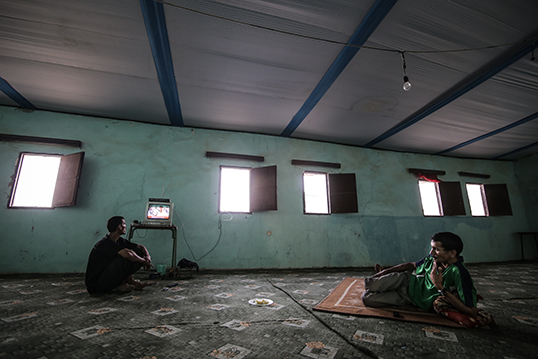
Waiting for change—any change. Refugee camp Smara, July 2014. © by Bartek Sabela
*
The Sahrawis had no written history. For centuries the legends of this people were passed down from person to person, giving rise to a sort of oral encyclopaedia. The poet Limam Boicha says that if this book were to be written down, the most important word in it would be khaima. A khaima is more than just a rectangular tent made from goat skin or camel hide, supported by one or two poles. It’s not just a shelter from the heat of the desert; it’s not just a home. It offers something more than protection against cold nights and sand storms. For a Sahrawi the tent symbolises unity, community, and, by extension, family. Three or more tents form the germ of a settlement—a frig. At the same time, the khaima is the shade that protects tradition, wisdom, and identity. And today it’s a nostalgic metaphor for lost freedom and the longed-for home.
But as of 2010, the khaima has also become, next to the Land Rover and the sky-blue dara’a, a loathed and forbidden symbol for the Moroccan regime. Like the flag of the SADR. Today it’s illegal to erect a khaima in El Aaiún, even on your own land. The most you can do is pitch it on your rooftop, sheltered by a tall concrete parapet. But what is a nomadic tent if it’s not surrounded by the sands of the desert?
So when you’re tired of this world of violence and brutality, you pack up your tent and drive out to the desert, away from the city. Out there you don’t have to pretend, to lie, conceal, conspire and watch what you say. The desert means freedom. It means tranquillity. It means safety. It’s a place where you can feel like a human being once again. Unless they follow you, their sole purpose being to ruin that moment of respite, to ask imbecile questions, to kick over your teapot, to tell you: it’s prohibited, get yourself back to the city.
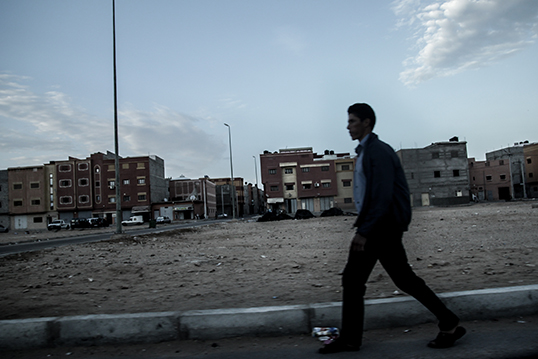
Moroccan occupied El Aaiún, the capital of Western Sahara. This is where the majority of demonstrations and riots against the Moroccan authorities take place. © by Bartek Sabela
*
First it was Tunisia. Then Egypt, and soon after Yemen. A moment later it was a veritable avalanche. Algeria, Jordan, Oman, Iraq, Libya, Morocco, Kuwait, Lebanon, and finally Syria. Dictators who had reigned for years began to fall one after the other. Zine El Abidine Ben Ali, then Hosni Mubarak, Ali Abdullah Saleh. Even Muammar Gaddafi, in power for forty-two years, was overwhelmed, though he put up a fight. Those whom the Arab Spring had not ousted from their presidential, royal, or ministerial positions were forced to make concessions and to meet the protesting citizens’ demands. At least in part, the Arab world was freeing itself from states of emergency, repression, restrictions on civil rights. Secret police agencies were dissolved, political prisoners were liberated, new constitutions came into being. But when Mohamed Bouazizi doused himself with gasoline and lit a match in front of the governor’s office in the Tunisian city of Sidi Bouzid on 17 December, Western Sahara had already been ablaze for two months.
Twenty-six-year-old Said Dambar was shot dead the night of 22 December 2010. His body was kept in the municipal mortuary for seventeen months and fifteen days, as his family wouldn’t agree to a burial without an autopsy, which the authorities refused. To persuade Said’s family that the autopsy was a bad idea, the police stormed their house several times and his parents were threatened with dismissal from their jobs. Eventually Moroccan police officers secretly interred Dambar in the communal cemetery. The family was not informed of the funeral and the circumstances surrounding his death were never cleared up. The Moroccan authorities claim that Said was acquainted with the policeman who shot him. They insist that he died as a result of a squabble in his killer’s home. Dambar is supposed to have drunkenly attacked the officer, who then had to defend himself. But people are telling a different story. They say that the bullet hit the young man in the street, and that it wasn’t a coincidence. They say it was because his family took part in Gdeim Izik.
*
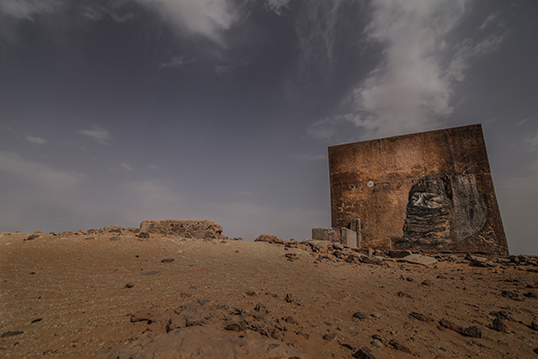
Is there any hope for a resolution of the conflict? A mural in the Sahrawi refugee camp Dakhla, July 2014. © by Bartek Sabela
They took their tents, blankets, divans, cushions, teapots, their children, old folks, and livestock, and they left. Far away from the cities they could no longer call their own. Wanting to escape the Moroccan occupation, even if only for a moment, they left their homes and went to the desert that had always been theirs and that always greeted them with open arms. Some went on foot, others drove in off-road vehicles, but everyone was in high spirits thinking about freedom. This was their ultimate gesture of desperation, distress, but also of determination and maybe hope. They pitched their khaimas some ten miles from the cities. In September 2010, dozens of tents appeared east of Dakhla. At the same time, near Smara, in the valley of the river Saguia el-Hamra, the desert played host to over two hundred tents and 1,300 people. On the Atlantic coast, near El Marsa, Playa de Aaiún, there were 120 tents. The Moroccan police disbanded these smaller camps within a few days. As a result the Sahrawis set out in the direction of El Aaiún.
There is a place, about eight miles southeast of the city, not far off the road to Smara. This road runs along a steep cliff over the valley of the dry river Saguia el-Hamra. Standing at the edge you see down below the little oasis of Lemseyd, with tufts of tall grass and date palms swaying in the wind. On the opposite side of the valley, the low buildings of a little settlement called Edchera and the ruins of the old Spanish garrison loom in the distance. Behind your back, meanwhile, extends a vast plain criss-crossed with low dunes. You might be surprised, but places in the desert also have names, even when they’re uninhabited. Sometimes those names are so old that no one remembers where they came from or what they mean. This place also has a name: Gdeim Izik.
Despite what you might think, there wasn’t anything special there. No legends connected to it, no symbols. Sand, gravel, and dunes just like anywhere else. Gdeim Izik was simply the place in the desert where people managed to pitch the first tents. Initially there were just a few, ten, twenty, but two days later they already numbered close to a hundred. Every day new ones appeared, one next to the other, along markers for alleys and crossings. Entire families poured in from the city, walking with bundles on their backs or in Land Rovers stuffed to the gills. Before long Sahrawis started arriving from Smara, Bojador, and even from faraway Dakhla. By mid-October about seven thousand tents had sprung up in Gdeim Izik, housing twenty thousand people.
The rumours reaching El Aaiún were vague and contradictory, so Hamza decided to go to Gdeim Izik and get a better idea of what was going on. He set out on foot with his younger brother Brahim and their friend Bachir Yaya. This was in the early days, when the tents were still counted in their hundreds, not in their thousands. And yet the Moroccan police had already erected barricades east of El Aaiún to block the Sahrawis’ constant stream. The police patrolled the city’s eastern districts as well as the exits towards Smara. Hamza, Brahim, and Bachir were asked to stop, too, but then the sentinels had to deal with a car attempting to get around the barricade, so the three young men simply walked out towards the desert. A few hours later they arrived at the expanding camp. The next day they returned with their khaimas. Bachir brought his entire family.
Four days after the first tents had been pitched on the plain of Gdeim Izik, on 14 October, the authorities of El Aaiún reluctantly began to negotiate with the protesters’ representatives. The Dialogue Committee set up by the Sahrawis was recognised and admitted to the table—something that had never happened before. A few days later Morocco’s Minister of Interior, Taïeb Cherkaoui, met the Committee in person. As during the First Sahrawi Intifada in 1999, the committee’s demands focused on social questions. The Moroccans stubbornly claimed that the local population had access to their natural resources and to jobs, and that respect for human rights was a norm in the Sahara, but in reality things were different. Sahrawis came last in line for jobs, housing, or benefits, and their children had limited access to education. Moroccans accounted for the great majority of workers in lucrative industries such as fishing or phosphate mining. Sahrawis never held any senior positions or higher offices, they were usually directed towards subordinate roles and manual jobs, and they were often paid less than their Moroccan colleagues. Someone quipped that whenever two cars collide, it’s always the Sahrawi’s fault, never mind the circumstances. On the day the negotiations began, unending columns of police vehicles, both light and heavy, arrived in the region of Gdeim Izik. Soon a dense cavalcade of white and dark blue police transporters formed in front of the camp, while a massive barricade wrapped in barbed wire sprung up near the entrance. One day, bulldozers assembled around the growing camp and encircled it with a seven-foot-tall earthwork, so that the only entrance was through the heavily guarded barricade. As the sinister ring tightened, the protesters were running out of time to attract the world’s attention. I asked Hamza what it was like in the camp, and after a moment of weighty silence he said: ‘Hang on, I must light up to tell you about that.’
‘For us it was nothing but a few days of freedom. For a few days we had our own little state, with a government, institutions, services. Everyone in the camp had a task. Some worked as security wardens, others distributed food and water, yet another group ensured the camp was kept clean. We even had a hospital in one of the tents. Everyone who came brought something along or at least contributed money. The streets in the camp had names, with Intifada Street at the centre. We even had traffic police! We were like a family during that month, all Sahrawis. We didn’t like the city where we lived, so we went and built our own. We saw how amazing it could be if only we had our own state. It was a kind of makeshift free Sahara.’
The Moroccans soon tried to infiltrate the camp. Spies and agents appeared among the protesters, trying to sabotage the organisers’ work. And so a second checkpoint popped up at the camp’s entrance, just behind the Moroccan barricade, where the Sahrawis quizzed anyone who wanted to enter. The litmus test was extremely simple: all they needed to do was check if the interviewee was fluent in their dialect, and Moroccans have difficulty pronouncing certain words in Hassaniya. The guards also ensured that no drugs, firearms or alcohol entered the camp. Hamza, being a poet, was responsible for the morale of the assembled people. He’d go around the camp spreading information, especially among the elderly, about the progress of the negotiations and the movements of the police; he also dispelled rumours so that the people wouldn’t be susceptible to sabotage. Uncertainty and danger prevailed, so the protesters’ morale was crucial. A police helicopter could always be heard circling above the Sahrawis’ tents.
‘Every now and again at night the Moroccan army would stage these false attacks. The regime denies it, but this was the regular army dressed in the uniforms of the gendarmerie. They’d turn on their sirens, start their transporters’ engines, blind us with their flashlights. Then we’d come out of our tents and, holding hands, walk towards them. We’d stand right before them. They didn’t attack. But a few days later they killed the first boy.’
It was coming up to 7 p.m. when Nayem Elgarhi, his brother Zubair, and three acquaintances drove up to the barricade at the entrance. Two weeks had already passed since the start of the protest. Police vehicles were cruising the desert around the camp, trying to intercept Land Rovers delivering food, water, medicine, but also people. They jammed mobile phone signals. The previous day fifteen cars were held up at the barricade and pelted with stones. Warning shots tore through the sky. The tension was growing every day. When the Elgarhi brothers’ Nissan Patrol approached the gendarmerie’s checkpoint, the first bullets shattered the windshield and brought the life of fourteen-year-old Nayem to an untimely end. Three days later he was secretly buried at an unknown location. His family was not allowed to attend the funeral.
Elgarhi’s death was silent. There were no cameras around, no journalists. Journalists, just like human rights activists, representatives of the Spanish parliament or of any other international organisation, were held up at the airports of El Aaiún or Agadir. Only a handful of foreigners managed to get through to the camp. The Italian Gilberto Mastromatteo was among them. I met him in Tifariti, in the eastern part of the Sahara, near the Algerian border.
‘We arrived in El Aaiún and started to scheme about how to get to the camp. Of course it wasn’t easy for foreigners, especially journalists. The first who went was Hugo, a politician. It’s a funny story. He’s an older guy, Italian, but he has very Arabian features, so dressing him up as a Sahrawi was quite easy. We decked him out in a dara’a and a turban. He just had to pretend to be mute, because of course he didn’t speak Arabic. It worked. With me and my mate it was a bit harder, as we were too white and didn’t look very convincing, even in disguise. So we decided simply to hide in one of the lorries carrying provisions. They concealed us under sacks of food, with people sitting on top. We were lucky: the weather was awful—a sand storm and rain. There was mud everywhere. The soldiers opened the trailer, they saw the people sitting there, but they weren’t in the mood to inspect the cargo. And so we found ourselves in the camp. That was on 1 November, a few days after that young boy had been killed. We were still there when the camp was surrounded by armoured vehicles, lorries, and more and more soldiers. After we departed, the only foreigners left in the camp were two from Resistencia Saharaui, Antonio from Mexico and Isabel from Spain, as well as two Spaniards from Sahara Thawra. They witnessed the pacification of the camp.’
On 6 November, during the festivities commemorating the Green March, King Mohammed VI gave a fiery speech in which he took a firm stand on the situation in Gdeim Izik. He said he wouldn’t tolerate any attempts to undermine Morocco’s territorial integrity and supremacy over the Sahara region. That day the police completely blocked the entrance to the camp and the Sahrawis in Gdeim Izik were cut off from the world. The people who had gathered at the police barricade were brutally dispersed, while additional army platoons, fire squads, and ambulances appeared at the camp.
Hamza had been ill for several days. The previous week he had given up his tent to a big family and moved in with some friends whose tent was pitched at the edge of the camp, in the first line, about a hundred yards from the police cordon. Fear was mounting in the camp, and the organisers were working hard to prevent an outbreak of panic. Hamza, lying down with a fever, had a good view of the tightening noose of policemen in black. ‘I was convinced they were going to attack. Many people thought it wasn’t going to happen, after all the world was watching, they wouldn’t dare to, but I knew it was only a question of time. I told Bachir we might die the next day. I asked him, half jokingly, half seriously, to wake me up, as I don’t want to die in my sleep.’
In New York, meanwhile, the United Nations were leading yet another round of informal talks between representatives of the Kingdom of Morocco and Polisario. If it hadn’t been for the two cameras in the camp, one held by Antonio and the other by Hamza’s friend, a young Sahrawi named Diana, it’s unlikely we would have ever found out what 8 November was like in Gdeim Izik.
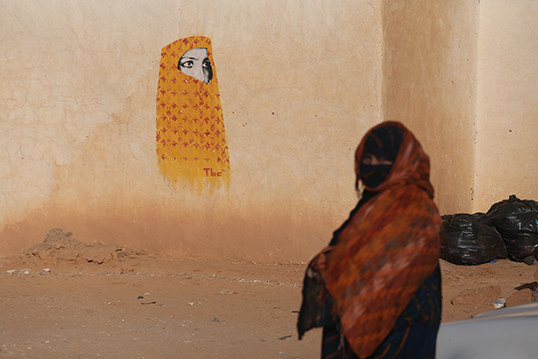
Sahrawi women take an active part in the struggle for their country’s independence. Refugee camp Boujdour. Tindouf Province, Algeria, December 2013. © by Bartek Sabela
*
Sirens, dozens, thousands, an entire horizon of deafening sirens, the green lights of police beacons rotating to the same regular rhythm, reflectors directed at the protesters, a wall of armoured transporters, special divisions of the gendarmerie, the army and GUS behind tall shields advancing towards the first tents, this time for real, a helicopter, film it, don’t stop filming!, the sky, a shower of stones like meteorites in August, the roar of engines, panic, police vehicles sounding their horns, a child, stars still visible in the sky, the clunk of steel, fists and sticks raised towards the sky, an elderly woman fleeing, again stones, cries, tents, sand, Land Rovers carrying away women and old people, darkness, a sea of tents and the first ones being destroyed by the police and then set on fire, lorries, jets of hot water fired from water canons, Allahu Akbar!, the helicopter’s blades just over the protesters’ heads, smoke, flames, they’re running, gas, tears, rubber bullets (though some say real ones, too), viva, fuera Maruecos!, sirens, sirens, sirens.
6 a.m., sunrise.
‘I stood facing them and took out my camera.’ Diana is a friend of Hamza’s. She laughs when I ask if her name is of Sahrawi origin. She dreams of becoming a flight attendant, though not with Royal Air Maroc. ‘They walked slowly, beating their shields with their batons. I observed them through my camera’s viewfinder. It was quite surreal. I imagined I was a great journalist filming something immensely important. They were within spitting distance, thirty yards perhaps. So I climbed on top of a car nearby. And suddenly I realised I was all alone, the others had retreated, there was no one anywhere near me, only them. I put away my camera, worth its weight in gold, and took out my phone. About ten of them came running over, they pushed me off the car; I wasn’t wearing a melhfa, so they assumed I’m Spanish. I fell to the ground and they started to beat and kick me. They shouted that now I was going to pay for it.’
Diana was saved by her friends and their stones. Hamza says that when she got up from the ground, bleeding, and they asked her if she was alright, she replied, ‘They didn’t ruin the camera!’ She was laughing, though she had blood running down her face. The Moroccan authorities denied that the policemen who pacified Gdeim Izik had used weapons or live ammunition. But a scene was captured on Diana’s camera in which a policeman was firing into the crowd. She also filmed one of her friends and the hole in his abdomen. She filmed an old man with a walking frame and four policemen clubbing him. She filmed a woman in front of a tent, struggling to stand up until they came and helped her with their batons.
‘We tried to evacuate the elderly and the children, to get them out of the camp as quickly as possible. The Moroccans had left the route to El Aaiún open, and that’s the way everyone fled. Our Land Rovers went back and forth. Sometimes each would carry more than a dozen people. In the meantime we grabbed stones and went to the front.’
We’re watching a YouTube video showing a moment in the camp’s pacification. ‘You see this guy bending down to pick up stones?’ Hamza points with his finger. ‘That’s me. They were in a hurry to get into the depths of the camp, to break it up from the centre. Four or five vehicles got in, but we blocked them between the tents and pelted them with stones. At the same time they were trying to attack us from the side, to cut us off from the rest of the camp, so in the end we had to retreat. The tents made it easier for us, as we could hide behind them. So they started to burn them down.’
Those who didn’t manage to retreat, who were sleeping or unable to run, were immediately thrown into police vans and taken out of the camp. Close to three thousand people were arrested during the pacification.
‘We fought them for four hours or so, retreating the whole time, so that the people behind us could flee. At the earthwork that surrounded the camp we found an older woman, she couldn’t walk and was trying to crawl over to the other side. I called a few friends over and together we dragged her across. She was incredibly heavy. And then someone put a little child in my arms, he was screaming his head off, but luckily his mother was found. I was among the last people to leave the camp, behind us there was no one left, only smoke from the burning tents and the police combing the ashes.’
Bruised and in tatters they returned to El Aaiún, mostly on foot. Those who managed to get a lift were sitting on roofs or clinging to doors or trunks. They had been forced to flee once again, leaving behind the smouldering camp and thirty days of freedom. Ahead of them was the city that didn’t want them. El Aaiún welcomed them with empty, deserted streets. Dense black smoke rose from burning cars, from scattered tyres and buildings. There were hastily erected barricades in the streets, as well as demolished shops and offices. The Sahrawis who had stayed in the city were waving flags and chanting, ‘La badil la badil an takrir al-masir.’ For a few hours the city was theirs.
The military and police didn’t arrive in El Aaiún until the afternoon, initiating a wave of repression against all Sahrawis. Soon Moroccan settlers joined in the riots. Tear gas was stinging everyone’s eyes and water cannons fired what felt like boiling water. A war had flared up on the city’s streets. As for the casualties, the two sides of the conflict give very different numbers. The authorities claim that eleven police officers died during the pacification, while 238 were injured. They also list 134 injured Moroccan civilians. Polisario published a report in which 36 Sahrawis are listed as dead, 700 as injured and 163 as disappeared. These numbers have not been verified. The 24 members of the Dialogue Committee that had been negotiating with the authorities were arrested. They were labelled terrorists and tried in a military court. On February 17, 2013 they were sentenced to 17 to 30 years of prison. Nine of them received life sentences. They were sent to the Zaki prison in Sali, in the suburbs of Rabat. The European Parliament adopted a resolution condemning the violent incidents of Gdeim Izik and also called on the UN to conduct an independent inquiry into the events. In the Security Council, the resolution was vetoed by France, the country where the notion of human rights was born.
Antonio and Isabel spent a week hiding out in the basement of an uninhabited building, fearing for their lives. Their material, meanwhile, was successfully secured and sent abroad. After a week of failed searches, the authorities announced through Laayoune TV that they would be granted a safe exit from Morocco. Diana was saved from repression thanks to a photograph the police found in the debris of her tent. She had brought it to Gdeim Izik by chance the day before the attack. She cannot say what it showed. Bachir Yaya went to prison again and was tried along with 160 people. Hamza spent several weeks hiding in El Aaiún, just like his brother Malainin had done before. He couldn’t show his face at home, and his friends assumed he had been arrested. Later they said jokingly that he couldn’t have ended up in the Black Prison, given that his surname is Lakhal, which means black. Finishing his story and his last contraband Marlboro, Hamza says: ‘There are times in life when you must be everything at once—a poet, a journalist, and a fighter.’
*
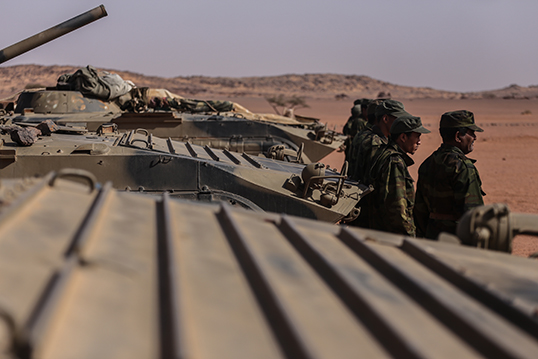
Resistance fighters of the Polisario Front at a base in the Liberated Zone of the Sahrawi Arab Democratic Republic, December 2013. © by Bartek Sabela
Hamza’s brother, Malainin Lakhal, says this:
‘Of course the war is not a solution. It would create huge problems in a region that already has plenty. It seems to me that Morocco is pushing for war, because a conflict would be convenient for them. In that case it is Morocco, and not us, who would gain strong international support. I believe in peaceful action, the kind that ended apartheid. I think we still have a chance to win without bloodshed, if we manage our activities well. Diplomatic activities, activities related to the exploitation of natural resources and the violation of human rights. We call this the politics of nonviolent resistance. Through our actions we show the real face of the Moroccan regime and discredit it in the eyes of the international community. This is a hard battle; it requires precise planning and coordination. But such policies, which we’ve pursued for many years, bring results. I’m convinced that Sweden will soon recognise our state. Iceland and Brazil, too. The only aim of a war is to force the other side to negotiate, to accept one’s conditions. But this is achievable without returning to war. Our leaders are in a difficult position now, given the pressure and expectations from our society. They’re no longer able to ignore that. It’s hard to predict the course and outcome of such a conflict. It’s not clear if a fire, once it’s been lit, can be put out again.’
But it’s rare to hear anyone express doubts about the looming war. I ask women, men, older and younger people, those who have experienced war as well as those who have no idea about it. And I hear the same answers everywhere. I ask people in the camps, those who live in the occupied cities as well as those who’ve settled in Europe, such as Mahjub Mohammed Dekka, who until recently was the representative of the Polisario Front in Poland. He’s one of three Sahrawis living in my country. His family live in Spain, his parents have remained in the camps in Algeria. Mahjub receives me in his small rented flat in a Communist-era block of flats in central Warsaw. This flat, on the tenth or twelfth floor, provides not only accommodation but also houses the diplomatic mission: since September 2012 it has been the Sahrawi Republic’s unofficial embassy in Poland. Throughout his tenure as a representative of Polisario, Mahjub tried every trick in the book to get through to Polish politicians, activists, organisations. He kept sending out letters to commissions in the lower and upper houses of parliament, he distributed information brochures in parliamentary offices, he visited the headquarters of political parties, tried to set up meetings with civil servants working on foreign affairs and human rights issues. He also worked to get the media interested in his country. He never got any replies to his letters. Over the course of two years only one politician, Senator Maciej Grubski, agreed to meet with Mahjub.
‘The entire law is on our side. All arguments suggest that we should go back to war. We agreed to a ceasefire because we were promised a referendum, and not in order to endure Moroccan occupation under the pretence of a UN mission. If there’s no referendum, there will be war. The politics of peaceful resistance, which we’ve engaged in for so many years, would only be meaningful if MINURSO had a mandate to monitor human rights, as in East Timor for instance. Otherwise the only option is war. I want that war with all my heart. In the worst case we’ll die with dignity. What do we have to lose? Without a country we have nothing.’
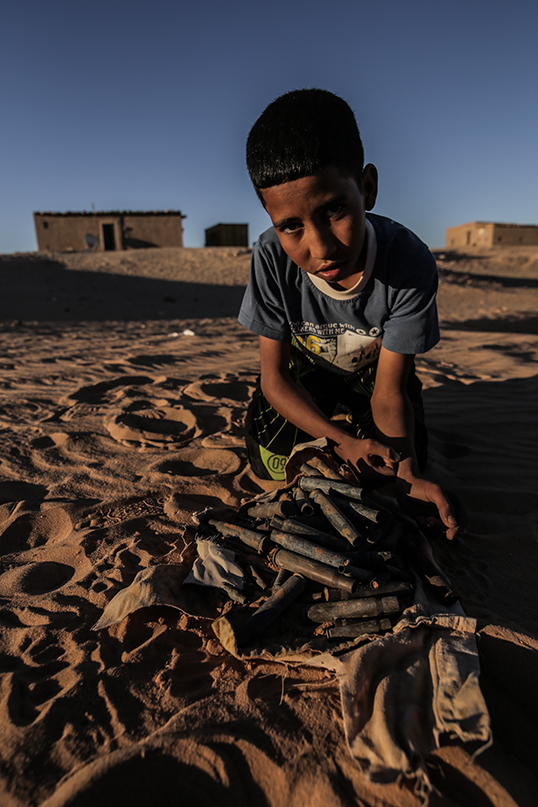
Given the political impasse, for many Sahrawis a return to war is the only chance to regain their lands. Ahmed, Hamida Abdulah’s son, at the refugee camp Boujdour. Tindouf Province, Algeria, January 2015. © by Bartek Sabela

